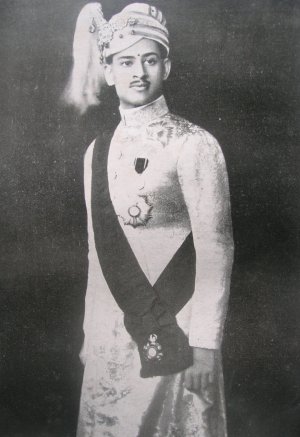One of the greatest figures in
South India’s musical tradition
is Swathi Thirunal (1813 –
1846), the maestro of Carnatic
music whose name is associated
with numerous compositions
in various languages and
moods. What makes him special
is that he was also a king
of Travancore and well remembered
for his able and progressive
administration.
Swathi Thirunal Rama Varma was born on April 16, 1813, to the regent queen of Travancore, Gowri Lakshmi Bai, and her husband Rajaraja Varma Koyimthampuran of Changanasseri Palace. At that time, the kingdom was under threat of annexation by the British, following the death of the reigning monarch (his maternal uncle, Karthika Thirunal Balarama Varma). Thus, the birth of a male heir was greeted with much cheer. The circumstances under which he was born earned the infant the title of Garbha Sreeman (“Anointed while in the womb”).
The prince lost his mother when he was four, and was brought up by his father and aunt, Princess Parvati Bai, who took over as the Queen Regent until he came of age. She was meticulous about his education. Tutors were appointed to teach him different subjects and languages. A bright student, he had mastered Malayalam and Sanskrit by age seven and was learning English, Tamil, Telugu, Kannada, Marathi and Persian. The palace provided all the encouragement he needed for his intellectual pursuits.
Herself a talented veena
player, his aunt invited
leading musicians from
other regions to perform in
the Travancore court. The
court poet was Irayimman
Thampi, a brilliant composer.
Swathi Thirunal
grew up surrounded by
music. His tutor, Subba
Rao, a Maratha scholar,
introduced him to a rare
musical instrument called
the surabath. Various
scholars from Thanjavur
and Pudukottai who visited
the court taught him the rudiments of
Carnatic music.
In 1929, at the age of 16, Swathi Thirunal took over the reins of the kingdom. From then on, he bestowed his personal attention on the affairs of the state. He appointed his former tutor, Subba Rao, as his Diwan or minister. The latter helped him to rule efficiently.
The young king was keenly interested in
music and the arts. Before long, his reputation
as a patron of cultural activities attracted
several musicians, dancers and writers
from all parts of India to his court. Among
the celebrities who adorned his court were
the four brothers known as the Thanjavur
quartet, all experts in several branches of
music and dance; Shadkala
Govinda Marar, a famous
Carnatic vocalist;
Ananthapadmanabha Goswami,
an exponent of Harikatha and
Hindustani music; Syed
Sulaiman, a Pathan who played
the surabath; and Allaudin from
Mysore, a Hindustani music
exponent. In addition to music,
other fine arts like dancing,
painting and architecture also benefited from the king’s patronage.
A staunch devotee of his family deity, Lord
Padmanabha, Swathi Thirunal took to composing
to express his devotion. His musical
compositions comprise over 400 devotional
compositions in Sanskrit, Malayalam,
Telugu and Kannada. A unique feature of
his work is that unlike all other composers
of his day, he did not restrict himself to the
Carnatic or Hindustani style alone, but
composed with equal ease in both. His
masterpieces include the Navaratri Kritis,
meant specially to be sung as the main
songs on each of the nine days of the
Navaratri festival, the Padmanabhasataka,
a devotional work addressed to Sri
Padmanabha in 100 verses, which is recited
by devotees inside the temple even today,
and the Utsavaprabandham, a composition
containing 12 songs and 42 verses in different
metres.
Swathi Thirunal’s achievements in the field
of administration were no less impressive.
A far-sighted administrator, he laid the
foundation of modern education in the state
by establishing English schools. He reorganised
and modernised the judiciary and
the police force. It was he who founded the
Trivandrum observatory in 1837, with the
most sophisticated equipment available at
the time.
Unfortunately, Travancore was then losing
its independence to the growing power of
the British empire. The sensitive king was
humiliated by the interference of the arrogant
Resident, Cullen. Gradually, he withdrew
from the
affairs of the
kingdom. He fell
ill, and passed
away on
December 25,
1846. He was
only 33.
Swathi Thirunal Rama Varma was born on April 16, 1813, to the regent queen of Travancore, Gowri Lakshmi Bai, and her husband Rajaraja Varma Koyimthampuran of Changanasseri Palace. At that time, the kingdom was under threat of annexation by the British, following the death of the reigning monarch (his maternal uncle, Karthika Thirunal Balarama Varma). Thus, the birth of a male heir was greeted with much cheer. The circumstances under which he was born earned the infant the title of Garbha Sreeman (“Anointed while in the womb”).
The prince lost his mother when he was four, and was brought up by his father and aunt, Princess Parvati Bai, who took over as the Queen Regent until he came of age. She was meticulous about his education. Tutors were appointed to teach him different subjects and languages. A bright student, he had mastered Malayalam and Sanskrit by age seven and was learning English, Tamil, Telugu, Kannada, Marathi and Persian. The palace provided all the encouragement he needed for his intellectual pursuits.
In 1929, at the age of 16, Swathi Thirunal took over the reins of the kingdom. From then on, he bestowed his personal attention on the affairs of the state. He appointed his former tutor, Subba Rao, as his Diwan or minister. The latter helped him to rule efficiently.



